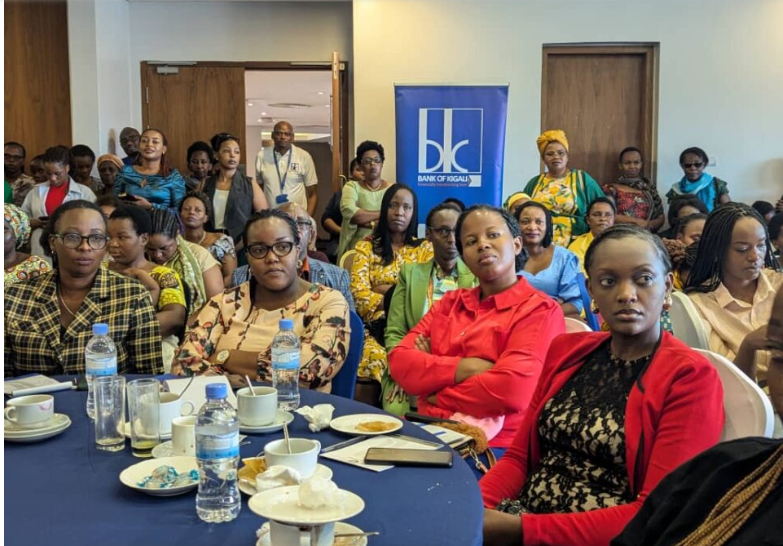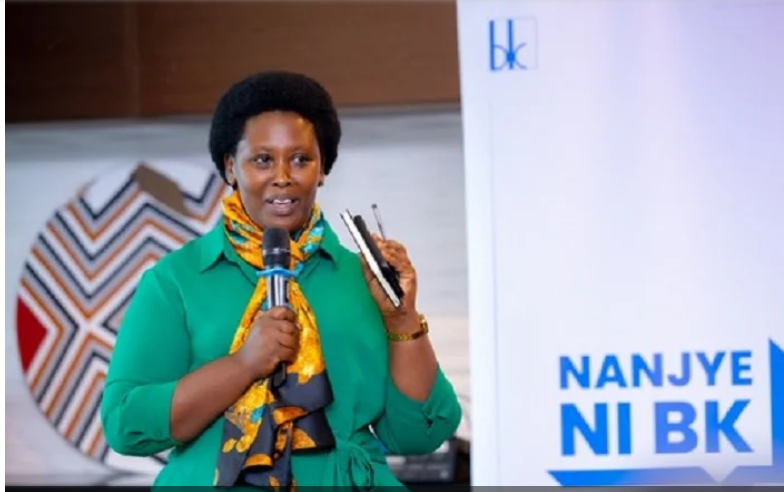 Kigali, Rwanda In a groundbreaking move aimed at promoting gender equality and boosting women entrepreneurship, the Bank of Kigali has launched a specialized financial product designed to empower women in business. This new initiative comes at a time when women entrepreneurs in Rwanda and across Africa continue to face significant barriers in accessing financial services. The Bank of Kigali’s offering seeks to provide targeted solutions to these challenges, making it easier for women to access capital, grow their businesses, and contribute to the country’s economic development.
Kigali, Rwanda In a groundbreaking move aimed at promoting gender equality and boosting women entrepreneurship, the Bank of Kigali has launched a specialized financial product designed to empower women in business. This new initiative comes at a time when women entrepreneurs in Rwanda and across Africa continue to face significant barriers in accessing financial services. The Bank of Kigali’s offering seeks to provide targeted solutions to these challenges, making it easier for women to access capital, grow their businesses, and contribute to the country’s economic development.
The launch of this new financial product is seen as a response to the growing recognition of the critical role women play in Rwanda’s economy, especially in small and medium-sized enterprises (SMEs). However, despite their contributions, women entrepreneurs in Rwanda and many other African nations often encounter difficulties in accessing formal financing, largely due to traditional financial structures, stringent collateral requirements, and systemic gender biases.
According to a 2020 report by the World Bank, over 70% of women-owned businesses in Africa struggle to obtain the funding they need to expand, with many relying on informal savings or family networks. The barriers include limited access to collateral, lower financial literacy rates, and societal norms that may discourage women from seeking out loans or taking financial risks.
Recognizing these hurdles, the Bank of Kigali has developed a product specifically tailored to address the unique needs of women entrepreneurs. This product, which offers flexible loan terms, reduced interest rates, and a comprehensive business support system, aims to break down the financial obstacles women face and enable them to succeed in the competitive world of business.
The financial product launched by the Bank of Kigali includes several innovative features designed to empower women at different stages of their entrepreneurial journey. Key highlights include:
Tailored Loan Packages The bank offers women entrepreneurs loans with lower interest rates and more flexible repayment schedules than traditional loans. This reduces the financial burden and allows women to invest in and grow their businesses without the fear of unmanageable debt.
Collateral-Free Loans Understanding that many women do not have access to the collateral required by many lending institutions, the Bank of Kigali is offering collateral-free loan options for qualified women-owned businesses. This is expected to open doors for those who have been previously excluded from the financial system.
Financial Literacy Programs Alongside access to capital, the bank is offering specialized financial literacy and business management training programs. These programs are designed to help women entrepreneurs improve their understanding of financial planning, cash flow management, and investment strategies. This will enable them to make informed decisions about how to best use the funding they receive to grow their businesses sustainably.
Business Mentorship and Networking As part of the initiative, the Bank of Kigali has established a mentorship and networking platform where women entrepreneurs can connect with successful business leaders, access mentorship, and share knowledge and resources. This platform is aimed at fostering a community of empowered women who can support each other and thrive collectively.
Access to Markets The product also focuses on helping women entrepreneurs penetrate larger markets, both locally and internationally. By providing resources and training in digital marketing, export readiness, and market access strategies, the Bank of Kigali aims to help women-led businesses scale up and tap into new revenue streams.
At the launch event in Kigali, Bank of Kigali CEO Diane Karusisi highlighted the bank’s broader commitment to gender equality and women’s empowerment in Rwanda’s financial sector. “Women are the backbone of our economy, yet many of them have been left out of the formal financial system for far too long. With this new product, we are ensuring that women entrepreneurs have the tools and resources they need to succeed, thrive, and contribute to Rwanda’s continued economic growth, she said.
Karusisi further emphasized that empowering women is not just about social justice; it is also a smart economic decision. Studies have shown that when women are empowered economically, they reinvest in their families and communities, leading to widespread benefits. By supporting women in business, we are supporting Rwanda’s future.
 The Rwandan government has long prioritized gender equality, with women playing a central role in its Vision 2050 development strategy. Rwanda is often lauded as a leader in gender equality in Africa, having one of the highest percentages of women in parliament globally and a strong emphasis on women’s economic empowerment. The launch of this financial product aligns with the government’s goals of fostering inclusive growth and reducing gender disparities in the private sector.
The Rwandan government has long prioritized gender equality, with women playing a central role in its Vision 2050 development strategy. Rwanda is often lauded as a leader in gender equality in Africa, having one of the highest percentages of women in parliament globally and a strong emphasis on women’s economic empowerment. The launch of this financial product aligns with the government’s goals of fostering inclusive growth and reducing gender disparities in the private sector.
The response to the new financial product has been overwhelmingly positive, with women entrepreneurs from different sectors expressing hope that this will transform the business landscape for women in Rwanda. Many shared personal stories of struggling to secure financing in the past and highlighted the significance of this product in making entrepreneurship more accessible.
Aline Uwimana, a small business owner in Kigali, shared her story at the event. As a woman in business, I have often found it difficult to get loans because I didn’t have the necessary collateral. This new initiative from the Bank of Kigali gives me hope because it removes many of the barriers that have held us back. I am excited to grow my business and take it to new heights.
Another entrepreneur, Grace Umutesi, who runs an agribusiness in rural Rwanda, also lauded the initiative. Many of us in the agricultural sector face challenges in accessing loans. We often work in informal settings, and our incomes fluctuate seasonally. The flexibility that this product offers is a game-changer. It allows us to invest in better equipment and supplies without worrying about rigid repayment schedules. This will empower many rural women like me.
While the Bank of Kigali’s initiative is seen as a significant step in empowering women, experts suggest that this is just the beginning. Financial inclusion for women requires ongoing commitment from both the public and private sectors, including the introduction of more financial products tailored to women, capacity-building programs, and continued advocacy for gender equity in financial services.
The Rwandan business community is optimistic that this initiative could be a model for other African countries seeking to address the gender gap in business financing. With more women able to access capital and grow their businesses, Rwanda’s economy stands to benefit from a more inclusive and diverse entrepreneurial landscape.
The Bank of Kigali has set a bold precedent with this financial product, one that could inspire more financial institutions to take concrete steps toward gender equity in business. For now, Rwandan women entrepreneurs have a new tool to help them succeed in the ever-evolving world of business, and the future looks promising.
The Bank of Kigali’s new financial product aimed at empowering women in business represents a significant milestone in Rwanda’s efforts to support gender equality and boost economic development. By addressing key challenges faced by women entrepreneurs such as access to credit, business development support, and financial literacy the bank is setting a strong example of how financial institutions can play a critical role in driving social and economic progress. As more women gain the resources and skills needed to succeed in business, the ripple effect will contribute not only to their personal success but to the overall growth of Rwanda’s economy.
Ennywealth


